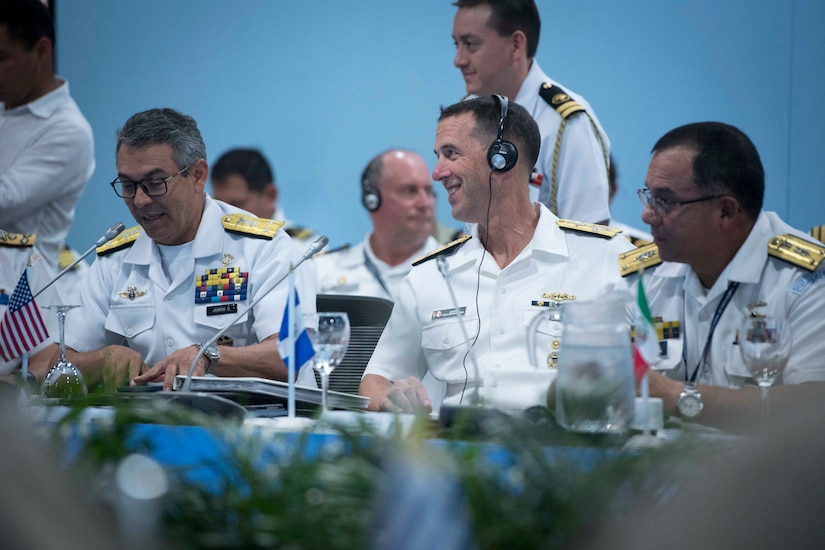By Jim Garamone, DoD News, Defense Media Activity
WASHINGTON -- The bedrock of America’s military advantage is
the system of alliances the United States maintains around the world.
Navy Adm. John M. Richardson, the chief of naval operations,
reached out to allies in South and Central America at the 28th Inter-American
Naval Conference last week in Cartagena, Colombia.
In line with the National Defense Strategy, Richardson is
looking to strengthen partnerships with like-minded nations.
Commitment to Regional, Global Institutions
"We are all Americans here; however, we are bound by
more than simply our shared geography," Richardson said during an address
to conference attendees. “We share inter-American values and a commitment to
regional and global institutions that are designed to confront common security
challenges.”
He added, “That we are here together is no coincidence.
While military-to-military-relationships are important, I believe Navy-to-Navy
partnerships are the 'first among equals.' These Navy relationships are so
natural because we share backgrounds, cultures, knowledge, and a love and
respect for the sea and what it can provide.”
That the conference was held in Cartagena was itself
significant. The city was once the seat of a notorious drug cartel. Colombia
was the scene of the longest-running civil war in the Western Hemisphere. But
democratic institutions won out and last year, peace talks between the
government and the Revolutionary Armed Forces of Colombia bore fruit and FARC
laid down its arms. Colombia is now an exporter of security, and a valued ally.
“Despite the challenges we face -- internal to our nations
or common to all -- our regional security relationship forms the keel of our
shared American ship,” the admiral said. “For me, this conference reaffirms
that keel is as steady and as strong as it has ever been.”
Building, Strengthening Relationships
The United States, he said, is committed to building new
relationships and strengthening old ones.
“The best thing to do is to be the best possible partner to
our friends and allies, and that's why the majority of our efforts here in this
region are focused on strengthening the partnerships that are backbone of the
regional security network,” Richardson said.
The nations work together in many different areas. Chile,
Colombia and Peru are all participating in the Rim of the Pacific exercise near
Hawaii. Colombia is participating for the 12th time. It is a sign of the
confidence the United States holds in its South American allies that Chilean
Commodore Pablo Niemann serves as the Combined Force Maritime Component
Commander; in effect, commanding all maneuvering afloat forces in a series of
high-end warfare missions.
“This RIMPAC is a landmark -- partners achieving their
maximum potential naval power, improving together,” Richardson said.
Exercise Unitas
Later this year, Colombia will host Exercise Unitas.
Planning for the exercise -- held yearly since 1959 -- has begun with
Argentina, Brazil, Canada, Colombia, Costa Rica, Ecuador, United States,
Honduras, Mexico, Panama, Peru, the United Kingdom and the Dominican Republic
meeting to discuss scenarios. The purpose of the exercise is to improve
coordination among naval forces.
“Our mutual participation in these exercises reflect the
security interests and the prosperity interests of our respective countries,”
Richardson said. “This is part of a broader, enduring effort to steam together
with your navies so that through training, we can learn to communicate, navigate
and operate together.”
But the deployments also serve a higher purpose, the admiral
said.
“They enhance security. They maintain order. They preserve a
system that is legal, transparent, and fair for all nations,” he said. “And
they promote prosperity for all.”
Richardson will continue on and meet with officials in
Brazil, Argentina and Chile.









No comments:
Post a Comment